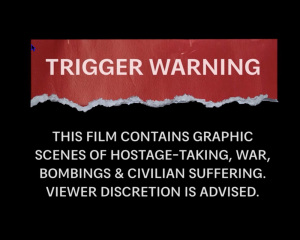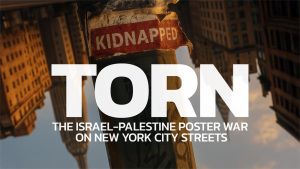
TORN has been described as “delving” into the heart of the controversy surrounding the ‘KIDNAPPED’ poster campaign, which turned some streets in New York City into unexpected battlegrounds by pro-Israel and pro-Palestine activists. What started as a seemingly straightforward effort to that turned into a savvy strategy to raise awareness for the 251 hostages taken by Hamas October 7, erupted into an emotionally charged ‘paper war,’ mirroring the complexities of a war thousands of miles away from the Big Apple.
This reviewer believes audiences should prepare for a documentary film experience unlike any in recent memory. It is, in this writer-reviewer’s opinion, a wrenching extraordinary emotional adrenaline pumping investigation, exploration and examination.
This reviewer anticipates that many viewers in audiences can expect to feel like they have been cinematically kidnapped, that is, becoming in a sense hijacked eyewitnesses who are actually on the scenes. For Clarification: This reviewer-writer is Pro-Palestinian and despises The Islamic Resistance Movement, abbreviated Hamas, a Palestinian nationalist Sunni Islamist political organization with a military wing – and definitely terroristic. This reviewer-writer is Pro-Israel and despises Prime Minister Benjamin Netanyahu for the crimes against humanity and genocidal wounding, slaying, butchering innocent Palestinians.
Lastly, this reviewer-writer is in awe that there aren’t reports of – at least none he has knowledge of thus far – of fistfights stemming from surfeit of scenes of poster-rippers’ provocative in-yer-face posturing and threatening and fingering.
Produced and Directed by Nim Shapira
www.torn-film.com
instagram: @torn_documentary
TORN opened theatrically September 5, 2025 in NYC (Cinema Village) and NJ (Teaneck Cinemas) Los Angeles opening September 12 – and then expanding to other cities later in September and October. A digital release (streaming/VOD) is expected later in 2025
Critical Acclaim for TORN
“Nim Shapira’s debut documentary manages to accomplish several complex tasks with minimal manipulation and without resorting to the repetitive imagery of horrors we’ve already seen. First, it presents the story behind the creation of the ‘KIDNAPPED’ posters, which became one of the defining symbols of the war.
Second, it reveals how the act of hanging and tearing down posters across New York City became a political event in itself, escalating into a battle over public space and narrative control. Third, Shapira sits in front of the camera with activists and relatives of abducted families living abroad, exploring the tension between the desire to help and the helplessness of watching events unfold from afar in a sometimes hostile environment.”
— Oron Shamir, Haaretz
“Of all the films I saw at the festival, Torn stood out as the most urgent and raw in its depiction of the evolving relationship between Israelis, American Jews, and an increasingly diverse urban America—marked by competing moments of solidarity and strain in the global conversation around the Gaza war.”
— Jacob Wirtschafter, Moment Magazine
“Torn reflects on how public discourse often does injustice to the pain of all sides. It moves beyond Israel-Palestine, examining dialogue in the age of social media and cancel culture—where the pursuit of values can end up undermining them.
The film navigates this terrain without losing sight of the human pain at its core, ultimately posing—at least visually—the possibility of mutual recognition of both Israeli and Palestinian suffering.”
— Ofer Liebergall, Srita.net

Director’s Statement Nim Shapira: As a filmmaker, I’ve always believed in storytelling as a tool for bridging divides and provoking honest conversation. Torn began as an attempt to capture a moment when my home—New York City, where I’ve lived for the past 12 years—was being pulled apart. Not just by headlines, but by the emotional aftershocks of a war taking place thousands of miles away.
On October 7, 2023, Hamas launched a brutal attack that sparked a devastating war in Gaza with Israel. In the days that followed, two street artists launched a campaign to raise awareness for the 251 hostages taken by Hamas. These weren’t just Israelis — they were, and still are, Hindus, Buddhists, Christians, Muslims, and Jews from over 40 nationalities. What began as an act of solidarity quickly spiraled into something far more layered: a symbolic “paper war” that unfolded on the walls of New York.
With Torn, I set out to document the winter of 2023 — those raw, disorienting weeks leading up to the first hostage release deal. During that time, the simple act of putting up or tearing down a poster became a political event, sparking confrontations across college campuses, neighborhoods, and social media. Suddenly, the war in Gaza wasn’t distant — it was here, reflected on our lampposts, our subway stations, and in the heated arguments between strangers.
I followed artists, activists, hostage family members, students, and ordinary New Yorkers as they wrestled with identity, grief, and the meaning of public space. My hope —t hen and now — was that in New York, where we don’t have rockets or missiles flying overhead, we might be able to sit and talk. That we could create space for conversation, even disagreement, without violence.
This film doesn’t shy away from discomfort or complexity. It dwells in the gray areas — between trauma and activism, doxxing and solidarity, freedom of speech and the boundaries of empathy. My aim was to humanize those caught in the emotional crossfire.
At every screening I’ve held over the past year, I’ve used this film as a platform to call for an immediate end to the war—and for the urgent release of the 50 hostages who remain in Gaza, still held by Hamas. That call will not stop.
In an era defined by polarization, Torn is both a mirror and a spark: a reflection of how far we’ve drifted apart, and an invitation to sit, reflect, and speak — even across disagreement.

the WORD Editor Gregg W. Morris